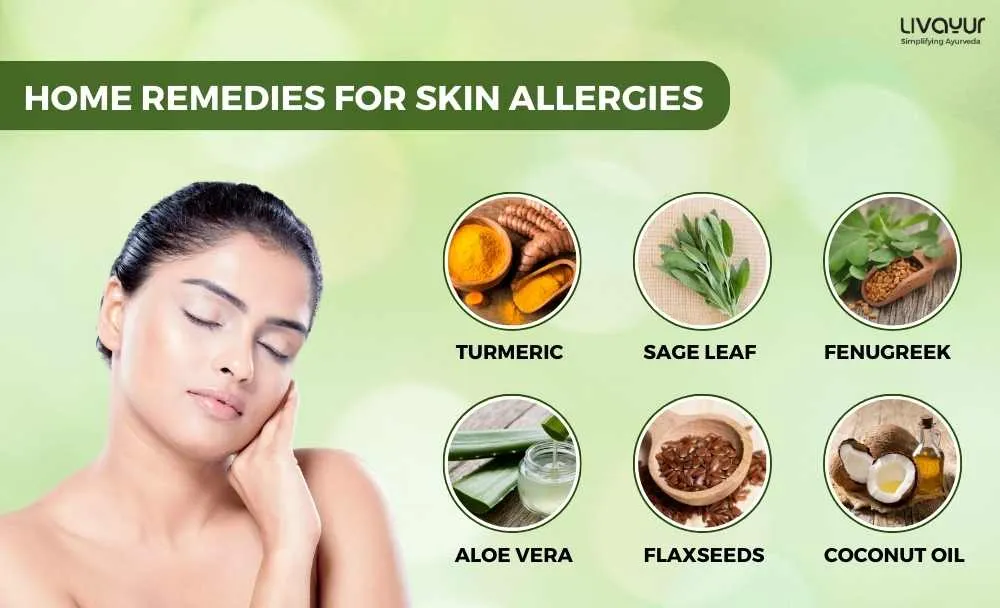
When skin turns red, swollen, and bumpy, it develops a rash. There are itchy, dry skin rashes. Others cause agony. Viruses, germs, allergies, and skin diseases like eczema are just a few of the many factors that can cause a skin rash.
In their lifetime, almost everyone experiences at least one skin rash. It’s fairly typical to occasionally experience itching or have brief periods of red, bumpy skin.
An allergic response on the skin can appear in several ways, frequently displaying symptoms like itching, redness, swelling, raised lumps, peeling, and even skin cracking as a result of dryness. Limiting or avoiding contact with the allergen causing the reaction is the key to treating skin allergies. There are, however, effective at-home remedies for allergic skin that can aid with symptoms when contact is unavoidable. These treatments offer a natural means of calming sensitive skin, and they can be especially helpful for treating allergies on the face. These natural solutions provide a comprehensive approach to treating allergic reactions and boosting skin health, from soothing itching to minimizing redness. [1]
Causes of skin allergies
Many skin disorders could be the reason behind allergies and itching on the skin. Some of those are as follows:
- Urticaria
- Angioedema
- Contact dermatitis
- Atopic dermatitis
However, the most common cause behind it is Atopic Dermatitis. Its pathogenesis is linked to a complex interaction between skin barrier dysfunction and environmental factors such as allergens and microbes. [7]
These disorders can be caused by the following allergens: [8]
- Latex, pet dander, or poison ivy
- Cold or hot temperatures
- Pollen
- Sunlight
- Water
- Food
- Insects
- Drugs
Symptoms of skin allergies
Following are the common signs of skin allergies: [8]
- Rash
- Itching
- Redness
- Swelling
- Raised bumps
- Scaling (flaking of skin)
- Cracked skin
Best home remedies for allergies itchy skin
You may experience itching from skin allergies, which can also cause your skin to become red and dry. Some of these symptoms can be treated and relieved with home remedies for allergies on the skin and natural therapies you can easily make at home. [3]
1. Turmeric:
Curcumin in turmeric shows promise in easing skin allergies. Its anti-inflammatory properties make it effective against various skin conditions. Despite being low-cost and well-tolerated, addressing challenges like low oral bioavailability is crucial for its full potential. Future studies exploring innovative formulations and combinations with traditional drugs could unlock turmeric’s efficacy as a natural remedy for skin allergies, offering a safe alternative in dermatological care. [6]
2. Sage Leaf:
Hailing from the Mediterranean, sage leaf stands out in herbal medicine for managing minor skin inflammations. Packed with compounds displaying inflammation-alleviating properties, sage leaf offers a natural remedy for those grappling with skin rashes. Applying sage oil, derived from this medicinal plant, delicately over rashes with a cotton swab provides a targeted approach to alleviating skin discomfort.
3. Evening Primrose:
Unlock the potential of evening primrose in reducing symptoms linked to atopic dermatitis and eczema. This natural remedy proves effective when applied topically, addressing inflammation, dryness, and itching. However, caution is advised for specific groups, including individuals with schizophrenia, epilepsy, children, and pregnant or breastfeeding women. Embracing evening primrose in one’s routine presents a promising avenue for managing allergic skin reactions.
4. Fenugreek Seeds:
Delve into the world of traditional herbal medicine with fenugreek seeds, celebrated for managing eczema and mild skin inflammation. Supported by animal studies highlighting inflammation-alleviating properties, fenugreek seeds offer a straightforward remedy. Incorporating the water obtained by boiling these seeds into bathing routines becomes a simple yet effective strategy for finding relief from skin rashes.
5. Aloe Vera Gel:
Harness the versatile healing properties of aloe vera in addressing acute skin inflammation. Enriched with enzymes, sterols, and carbohydrates contributing to its inflammation-reducing prowess, aloe vera gel offers a soothing touch for minor skin inflammations and related disorders. Opt for freshly extracted aloe vera gel for maximum benefit, providing a natural and refreshing remedy for skin rashes.
6. Oats:
Embrace the rich array of bioactive compounds found in oat straw (Avenae stramentum) to tackle various skin inflammations and seborrheic skin diseases accompanied by itching. Crafting a mixture of oats with curd and honey provides a tailored solution, particularly suitable for addressing skin allergies on the face. [2]
7. Oak Bark:
Delve into the roots of traditional herbal medicine with oak bark, utilized in managing minor skin inflammation, purulent skin diseases, and exuding eczema. While offering potential benefits, exercise caution, especially regarding prolonged use and application in children and adolescents. Whether employed in baths or through the addition of oak bark essential oil, this remedy taps into the healing properties of nature.
8. Flaxseeds:
Explore the bioactive components of flaxseeds (Linum usitatissimum), offering a holistic approach to managing skin health. With properties promoting skin smoothening, irritation relief, and inflammation alleviation, flaxseeds provide a versatile remedy. Whether applied as a warm poultice or integrated into one’s diet, flaxseeds present a diverse and accessible solution for addressing skin allergies and rashes.
9. Coconut Oil and Baking Soda:
Uncover the practical benefits of baking soda in addressing skin pH imbalance and acting as an anti-inflammatory agent. Whether applied as a paste mixed with water or coconut oil, or integrated into a soothing bath, baking soda offers a refreshing remedy for itchy skin caused by allergies. Its versatility allows individuals to choose a method that best suits their preferences, making it a valuable addition to the array of home remedies for skin discomfort. [5]
10. Tamarind:
Tamarind functions as a barrier for the skin thanks to its special component xyloglucan. This organic substance aids in forming a barrier that protects your skin cells from irritants like allergies and dangerous substances. Applying xyloglucan, an ingredient in tamarind seeds, reduced tissue alterations and mast cell activity in mice with skin allergies, according to studies. This improved skin health. Although encouraging, it’s important to wait for confirmation from more studies. If you want to perhaps get rid of itchy skin brought on by allergies, think about using tamarind-based remedies. [4]
As a result, these natural treatments provide a wide range of tools for easing and treating different skin allergy symptoms. Each cure addresses a certain skin issue, from the natural power of German chamomile to the inflammation-alleviating characteristics of sage leaf and the adaptable healing touch of aloe vera gel. Adopting these natural remedies not only relieves itchy skin rashes but also takes care of allergic reactions on the face. The combination of conventional treatments like fenugreek seeds and oak bark with more contemporary ones like baking soda demonstrates the breadth of these inexpensive and efficient at-home remedies for skin allergy on the face and home remedies for itchy rashes on the skin.
When to seek medical help? [9]
While the majority of rashes don’t pose a threat to life, some may indicate a more serious condition. See a board-certified dermatologist right away if you have a rash and have any of the following symptoms or head to the emergency room:
- When your entire body is covered in rashes.
- When you have rashes with a fever.
- When the rash appears suddenly and grows quickly.
- When it starts to blister on the rash.
- If a blistering rash appears on your genitalia.
- If the rash hurts.
- If it is an infectious rash. (Yellow or green fluid, swelling, crusting, pain, warmth, and a red streak emanating from the rash are signs of an infected rash)
In any case, instead of treating the rash on your own, see a trusted medical expert or a dermatologist for the proper diagnosis and treatment.
FAQs
1. What triggers allergies and skin rashes?
Itching, redness, swelling, and dryness are signs of skin rashes caused by viruses, germs, allergies, and disorders like eczema.
2. Who is impacted by skin allergies, and how prevalent are they?
Skin rashes are frequent; common symptoms include itching and red, bumpy skin. Any person, regardless of age or gender, could be impacted.
3. What natural treatments are reliable for allergic skin reactions?
German chamomile, sage leaves, evening primrose, fenugreek seeds, aloe vera gel, oats, oak bark, flaxseeds, baking soda, and tamarind are a few examples of natural medicines that provide a variety of techniques for treating skin allergies and rashes.
4. Can allergies to the face be treated with these treatments?
Several of these natural medicines, including aloe vera gel and German chamomile, are especially useful for relieving facial irritation and discomfort.
Disclaimer:
This article is written from a health and lifestyle perspective. It is for general information and not meant to substitute any medical advice. Please consult your doctor for appropriate medical consultation.
References:
- Skin Rash
- Anti-inflammatory activities of colloidal oatmeal (Avena sativa) contribute to the effectiveness of oats in treatment of itch associated with dry, irritated skin
- Medicinal plants used in treatment of inflammatory skin diseases | Postepy Dermatol Alergol. 2013 Jun; 30(3): 170–177.
- Anti-allergic activity of natural plant products for the treatment of sensitive skin: A review
- Effiicacy of a topical formulation of sodium
- Potential of Curcumin in Skin Disorders
- Allergy and the skin
- Skin allergies | aafa.org
- Rash 101 in adults




















